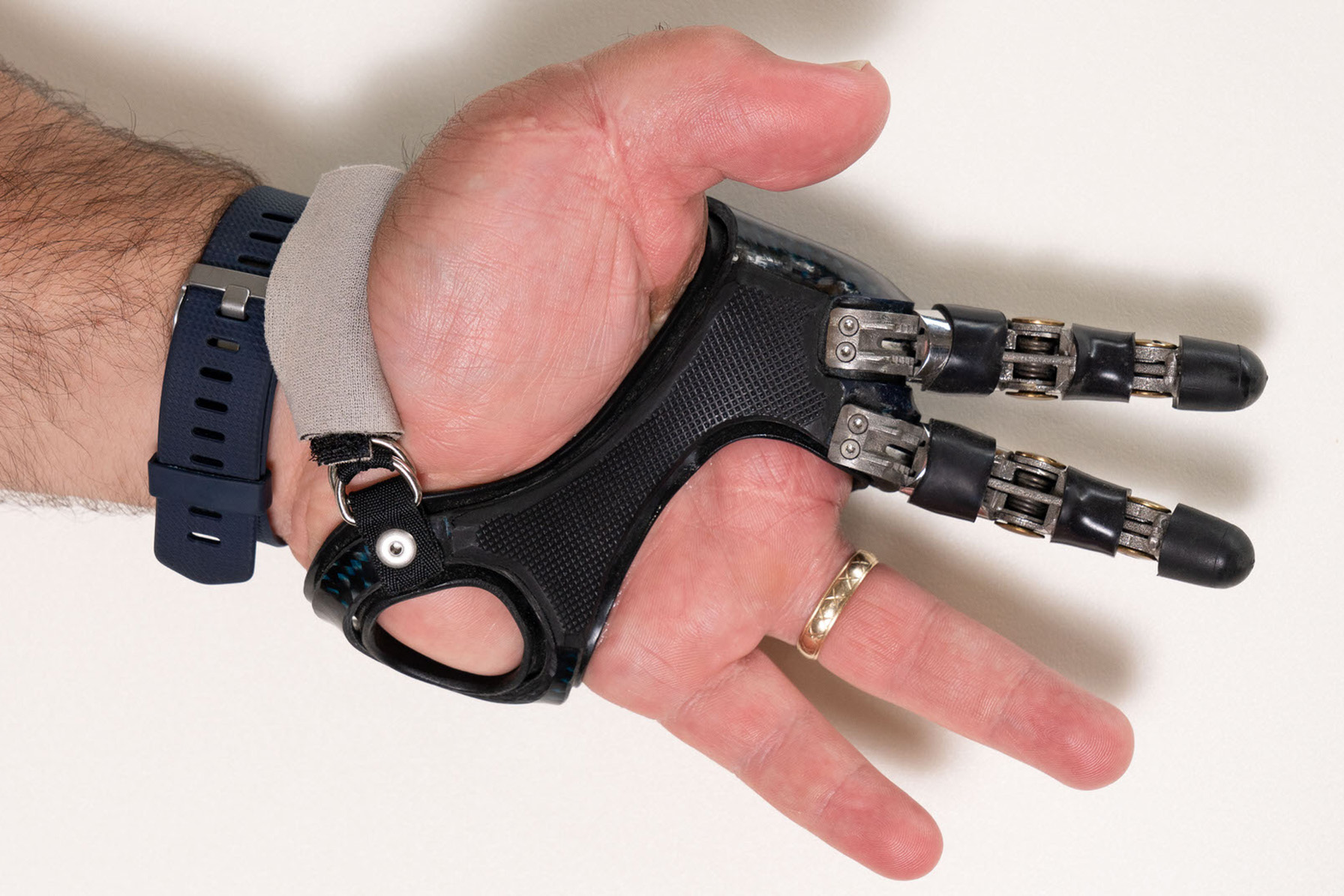Losing any part of your body is an incredibly traumatic experience. Whether it’s the result of an accident, an on the job injury, military service or illness, the loss of a limb brings everyday life to a halt.
As a psychologist and a lower limb amputee, I believe that it’s not possible to lose part of a limb without some degree of emotional distress. Feelings of sadness and depression, panic about the future, how you’ll make a living or take care of your children — these sorts of concerns are common and normal, especially during the first few weeks.
Here are five key factors to help you understand more about the psychological impact of limb loss.
1. Upper limb loss is highly visible.
Most people with lower limb loss can wear a pair of long pants, and their limb difference or prosthesis becomes invisible to others. But if you lose part of an upper limb, you can’t just cover it up. In fact, you may be the object of unwanted attention and questions from strangers. It definitely takes time to get used to the fact that your body image has changed.
One positive trend is the availability of upper limb prosthetic components that look ‘bionic’ and also offer increased function. Instead of trying to stay off the radar, many people are excited with the high-tech appearance of their prosthesis and they actually enjoy showing it off.
2. Traumatic limb loss can lead to post-traumatic stress disorder (PTSD).
Besides dealing with anxiety and depression, people who lose a limb in a traumatic injury may show signs of PTSD. This could include panic attacks and flashbacks during the day, or nightmares that affect the quality and quantity of their sleep.
If you or someone you know is experiencing PTSD related to limb loss, you don’t have to try to handle it on your own. There are trained counselors that can help you regain a sense of control over your life. Your counselor or physician may recommend medications to help improve your symptoms. To learn more about PTSD, reference this article, “PTSD is not just for veterans”.
3. Family members also suffer.
When a person loses a limb, the people who are close to them are also impacted by feelings of sadness, anxiety and sometimes guilt. Spouses are deeply impacted by their husband or wife’s loss, and in addition, are faced with the stresses of becoming a primary caregiver. [You can find more information about this in Arm Dynamics' article, "Effects of An Amputation on a Partnership – Partner Perspective."]
When children lose a limb, parents struggle with the loss as if it were their limb. They may feel somehow responsible or think they should have been able to protect their child from accident or injury. If there are other children in the family, they may feel anxious or worried that it could also happen to them. Even when the child is an adult at the time of injury, it can be difficult for parents to cope.
Parents of children who are born with a limb difference may also experience shock and sadness early on. There’s a blog on this site about congenital limb differences with resources specifically for parents.
The emotional impact of limb loss on family members is often delayed because they feel like they’re being selfish if they focus on how they’re feeling. It’s important for family members to know that talking with a counselor is a good idea and not a sign of weakness. In fact, it can be beneficial for an entire family to have the support of a counselor and the opportunity to safely express their feelings.
4. Some people need treatment for depression and others don’t.
Not every person who experiences limb loss needs to work with a counselor. Some people work through depression on their own, over time. Having a strong circle of support that includes family members, pets, friends and a peer support group will go a long way to helping you heal and move forward. But if your emotions are overwhelming and last more than a few weeks, reaching out to a counselor is definitely warranted.
It takes strength to admit that you’re struggling. People with clinical depression may do the bare minimum to survive every day and spend a lot of time in bed or sleeping. Seeing a counselor can reduce that sense of hopelessness and exhaustion. It is possible to move forward again and it’s easier to do that with professional support. Your physician, case manager, or clinical therapy specialist may be able to refer you to a counselor or you can search professionals in your area on this national database from Psychology Today.
Many amputees say they get the best advice from other amputees — people who know from experience what it’s like to lose a limb or be born with a limb difference. “If I Knew Then What I Know Now,” a YouTube video from shoulder-level amputee Meghan Absten, takes a look at loss, grief, struggle and moving forward.
Another two resources are Arm Dynamic's Private Facebook Support Group (you must ask to be a member) and a blog post (aimed at people with partial hand and finger loss, but helpful overall) from Naked Prosthetics that looks at the connection between mental health and partial hand amputation.
The Arm Dynamics team understands the importance of mental health and approaches prosthetic rehabilitations holistically. They offer screening during the evaluation process to be able to identify issues and offer referral support early on.
5. Prosthetic rehabilitation can accelerate your emotional recovery.
Getting started with prosthetic rehabilitation can be psychologically empowering for new amputees and their families. Initiating prosthetic care early on lets you see how various devices can help restore your independence, while delaying rehabilitation may keep you focused on what you can’t do.
Learning a new way of doing things is never easy. Prosthetic rehabilitation can be uplifting, but it also requires patience, a lot of practice and the ability to tolerate frustration. Chronic and untreated symptoms of depression and anxiety can make it difficult for you to persevere and get the most out of the prosthetic rehabilitation process. Deciding to connect with a counselor could mean the difference between learning how to move forward with a prosthesis and giving up.
If you’d like to share your thoughts about the emotional impact of upper limb loss, please leave a message in the comments below. You can use the form at the bottom of the page to submit questions or ask to be contacted by an Arm Dynamics team member.
For more information, see related articles here:
 Dr. Suzi Phelps is a clinical psychologist with more than 20 years of experience. She specializes in cognitive-behavioral therapy and is currently in private practice, working with a broad spectrum of clients. Her areas of expertise are individuals struggling to resolve trauma, depression, anxiety and relationship issues.
Dr. Suzi Phelps is a clinical psychologist with more than 20 years of experience. She specializes in cognitive-behavioral therapy and is currently in private practice, working with a broad spectrum of clients. Her areas of expertise are individuals struggling to resolve trauma, depression, anxiety and relationship issues.
Dr. Phelps has presented to professional and patient audiences speaking on the topics of "Coping with an Amputation" and "Compassion Fatigue", and has also been consulted as an expert witness. www.suziphelpsphd.com






 Dr. Suzi Phelps is a clinical psychologist with more than 20 years of experience. She specializes in cognitive-behavioral therapy and is currently in private practice, working with a broad spectrum of clients. Her areas of expertise are individuals struggling to resolve trauma, depression, anxiety and relationship issues.
Dr. Suzi Phelps is a clinical psychologist with more than 20 years of experience. She specializes in cognitive-behavioral therapy and is currently in private practice, working with a broad spectrum of clients. Her areas of expertise are individuals struggling to resolve trauma, depression, anxiety and relationship issues.


%20President%20and%20Senior%20Clinical%20Director.jpg?width=600&height=600&name=John%20M.%20Miguelez%2c%20CP%2c%20FAAOP(D)%20President%20and%20Senior%20Clinical%20Director.jpg)










No Comments Yet
Let us know what you think